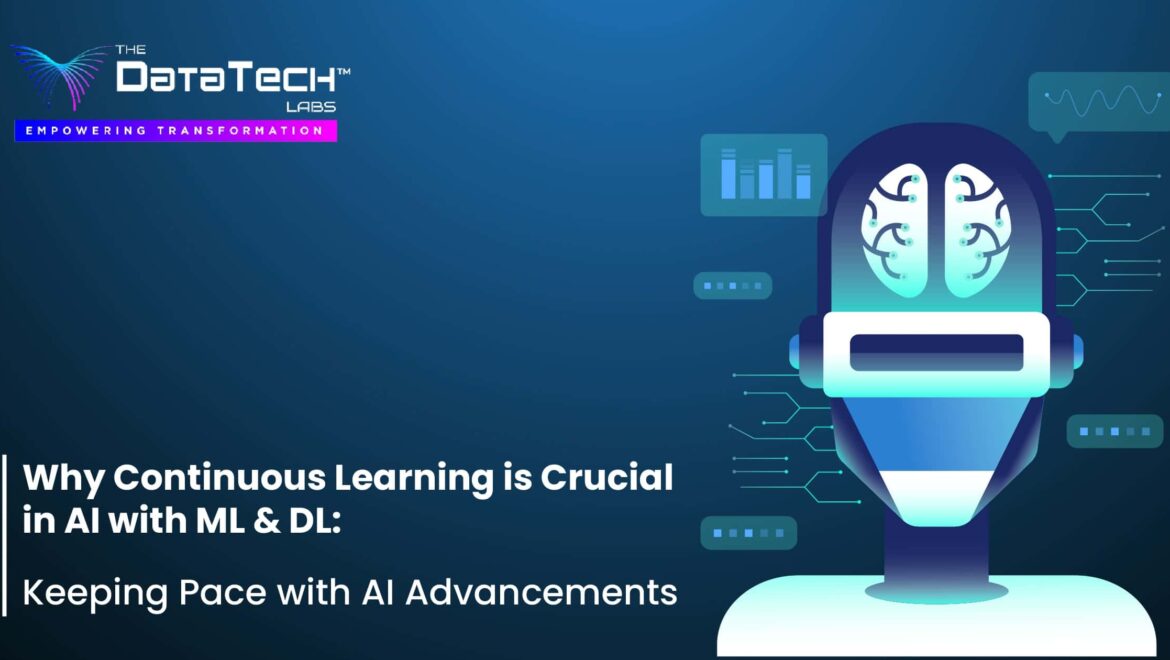Introduction
Defining Continuous Learning in AI
Continuous learning refers to the ongoing process of acquiring new knowledge and skills throughout one’s professional life. In the context of artificial intelligence (AI), machine learning (ML), and deep learning (DL), continuous learning is essential to keep pace with the rapid advancements in technology and methodologies. This ongoing education ensures that professionals remain competent and innovative in their field.
The Rapid Evolution of AI Technologies
AI technologies have seen unprecedented growth over the past few years. From advancements in natural language processing (NLP) to breakthroughs in autonomous systems, the pace at which AI, ML, and DL evolve is staggering. Staying updated with these changes is not just beneficial but necessary for anyone involved in the AI industry.
The Necessity of Continuous Learning in AI
Keeping Up with Technological Advancements
The AI landscape is continuously evolving with new algorithms, models, and tools being developed at a breakneck speed. Professionals need to stay abreast of these advancements to apply the latest and most effective techniques in their work. This ensures that they remain competitive and can leverage new technologies to solve complex problems more efficiently.
Adapting to Industry Changes
Industries that rely heavily on AI are constantly changing their standards and practices. Continuous learning helps professionals adapt to these changes. By studying case studies of companies leading in AI through ongoing education, one can understand how staying updated translates to industry leadership.
Enhancing Skill Sets
For AI professionals, continuous learning is crucial for skill development. The field of AI requires a broad set of skills, including programming, data analysis, and understanding complex algorithms. Continuous learning helps professionals enhance these skills and keep up with the latest best practices.
Methods of Continuous Learning
Formal Education and Certifications
Enrolling in degree programs specific to AI, ML, and DL can provide a structured and comprehensive education. Additionally, certifications from recognized institutions validate one’s skills and knowledge, making them more attractive to employers.
Online Courses and Workshops
Online platforms offer numerous courses on AI, ML, and DL. These courses are often designed by industry experts and provide flexibility for professionals to learn at their own pace. Workshops and bootcamps offer intensive, hands-on experience that can be immediately applied to real-world problems.
Reading Research Papers and Journals
Staying updated with the latest research papers and journals is essential. Key publications in AI provide insights into cutting-edge developments and emerging trends. Developing techniques for effective paper reading, such as focusing on abstracts and conclusions, can help professionals quickly grasp new concepts.
Participating in AI Communities and Forums
Being part of AI communities and forums allows professionals to network, share knowledge, and stay informed about the latest trends. Engaging with peers can lead to collaborations and provide support in navigating complex challenges.
Attending Conferences and Seminars
Major AI conferences and seminars are invaluable for learning about the latest advancements and networking with leading experts. These events often feature presentations on groundbreaking research, workshops, and discussions that can significantly enhance one’s understanding of the field.
Tools and Resources for Continuous Learning
AI and ML Libraries and Frameworks
Popular libraries like TensorFlow and PyTorch are central to AI development. Staying updated with new features and versions of these libraries ensures that professionals can utilize the latest functionalities and improve their work.
Datasets and Benchmarking
Using the latest datasets and benchmarking against them is crucial for developing robust AI models. High-quality datasets are essential for training and testing models, and staying informed about new datasets can lead to better performance and innovation.
Learning Management Systems (LMS)
LMS platforms can aid in continuous learning by providing structured courses, tracking progress, and offering resources. Examples of effective LMS for AI learning include platforms like Coursera, Udacity, and edX.
Overcoming Challenges in Continuous Learning
Time Management
Balancing work and learning can be challenging. Effective time management strategies, such as setting specific learning goals and allocating dedicated time for study, can help professionals stay on track.
Keeping Up with Rapid Changes
The rapid pace of change in AI can be overwhelming. Professionals need to develop methods to stay current, such as following leading researchers and organizations on social media, subscribing to newsletters, and joining relevant online groups.
Access to Resources
Accessing high-quality learning materials can sometimes be a barrier. Utilizing free and open-source resources, attending webinars, and taking advantage of free trial periods for online courses can help overcome this challenge.
The Future of Continuous Learning in AI
Lifelong Learning and Career Growth
Continuous learning significantly impacts career progression. As the job market for AI continues to grow, professionals who engage in lifelong learning are more likely to advance and secure high-level positions.
The Role of Organizations in Promoting Continuous Learning
Organizations play a crucial role in supporting continuous learning by providing access to resources, funding education, and encouraging a culture of innovation. Examples of companies investing in AI education highlight the benefits of such support.
Innovations in Learning Technologies
Emerging technologies in education, such as AI-driven personalized learning platforms, are transforming how professionals learn. These innovations offer tailored learning experiences, making it easier to acquire and retain knowledge.
Conclusion
The Imperative of Continuous Learning in AI
In summary, continuous learning is not just beneficial but imperative in the field of AI. Staying updated with the latest advancements, enhancing skill sets, and adapting to industry changes are essential for maintaining competitiveness and driving innovation. As AI technologies continue to evolve, the commitment to lifelong learning will remain a cornerstone of success for AI professionals.
FAQ's
The best way to start learning AI and ML is by taking online courses from reputable platforms, reading introductory books, and working on small projects to gain practical experience.
AI professionals should aim to update their skills continuously, ideally engaging in learning activities weekly or monthly, to keep pace with the rapid advancements in the field.
Yes, certifications in AI are worth it as they validate one’s knowledge and skills, making professionals more competitive in the job market and often leading to better job opportunities.
Top online courses for AI include those offered by Coursera, Udacity, edX, and MIT OpenCourseWare. Specific popular courses include Andrew Ng’s Machine Learning course on Coursera and the Deep Learning Specialization.
Staying updated with the latest AI research can be achieved by following key journals like the Journal of Machine Learning Research, attending conferences such as NeurIPS, and subscribing to newsletters and blogs from leading AI researchers.
Major challenges include managing time effectively, keeping up with the rapid pace of change, and accessing high-quality learning resources.
Balancing a job with continuous learning can be managed by setting specific learning goals, creating a structured schedule, and making use of micro-learning opportunities during breaks or commutes.
Essential conferences for AI professionals include NeurIPS, ICML, CVPR, and AAAI. These conferences offer insights into the latest research and provide networking opportunities with leading experts.
Organizations can support continuous learning by providing access to online courses, funding for education, encouraging participation in conferences, and fostering a culture of continuous improvement.
Future trends in AI learning technologies include AI-driven personalized learning platforms, virtual reality for immersive learning experiences, and the integration of gamification to enhance engagement and retention.





free backlinks submitter
This is the proper weblog for anybody who needs to search out out about this topic. You notice a lot its virtually onerous to argue with you (not that I actually would want…HaHa). You undoubtedly put a new spin on a topic thats been written about for years. Great stuff, simply nice!